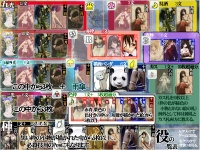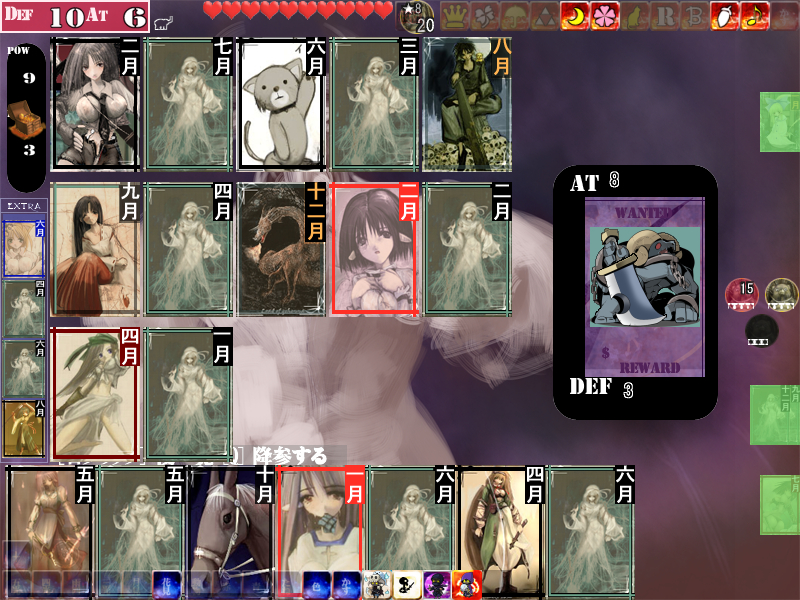Difference between revisions of "Way"/Gameplay/Hanafuda System"
(→Expanded KoiKoi) |
(→Expanded KoiKoi) |
||
| Line 12: | Line 12: | ||
Most important are the advantages you and your opponents can gain in the card game itself, mostly by elemental alignment and how they relate to various yaku. | Most important are the advantages you and your opponents can gain in the card game itself, mostly by elemental alignment and how they relate to various yaku. | ||
{| | {| | ||
| − | | || '''Defense/Attack''' || '''Life''' || style="text-align:right;" | '''Point Quota''' || style="text-align:right;" | ''' | + | | || '''Defense/Attack''' || '''Life''' || style="text-align:right;" | '''Point Quota''' || style="text-align:right;" | '''-''' |
|- | |- | ||
| style="text-align:center; vertical-align:top" | '''<br><br><br><br>POW'''<br><br>'''Treasure''' || colspan="5" rowspan="5" | [[File:Way_Stage.jpg|center]] || rowspan="5" style="text-align:center; vertical-align:middle;" | '''Initial<br>Torifuda''' | | style="text-align:center; vertical-align:top" | '''<br><br><br><br>POW'''<br><br>'''Treasure''' || colspan="5" rowspan="5" | [[File:Way_Stage.jpg|center]] || rowspan="5" style="text-align:center; vertical-align:middle;" | '''Initial<br>Torifuda''' | ||
| Line 43: | Line 43: | ||
'''Point Quota:''' The number underneath the ★6, which is the difficulty, is the number of points you must score to succeed. Out of all the difficulty modifiers you can acquire, this one is non-negotiable; whether you enter a ★6 hunting ground with 3 Hunt ability or 12, you face a 30 point quota. This gives the opponent a great advantage; they don't have a point quota to meet so they don't have to score big, they only have to score to eliminate you from the round. If you are unable to score at least 30 points by the end of the 3rd round, you fail. | '''Point Quota:''' The number underneath the ★6, which is the difficulty, is the number of points you must score to succeed. Out of all the difficulty modifiers you can acquire, this one is non-negotiable; whether you enter a ★6 hunting ground with 3 Hunt ability or 12, you face a 30 point quota. This gives the opponent a great advantage; they don't have a point quota to meet so they don't have to score big, they only have to score to eliminate you from the round. If you are unable to score at least 30 points by the end of the 3rd round, you fail. | ||
| − | |||
'''Support:''' Along the bottom are icons indicating the support you have for this round. These may be bonuses to overall ability, or any of the 6 basic stats that can modify the game, or the addition of an elemental attack. More explanation of these are in sections on Quests and Serious Seeding. | '''Support:''' Along the bottom are icons indicating the support you have for this round. These may be bonuses to overall ability, or any of the 6 basic stats that can modify the game, or the addition of an elemental attack. More explanation of these are in sections on Quests and Serious Seeding. | ||
Revision as of 16:58, 18 June 2015
| This article is a stub. You can help the Hgames Wiki by expanding it. |
At the core of Way"s exploration, combat, and sex system is the game of Koikoi ("Keep going"); not just the game, but the metagame. Every success or failure is determined by three rounds of play, or multiples of three.
- Recent changes
- All pages
- Wiki tutorial
- Purge (this page)
all characters are at least 18
Story
- Hanafuda System
- Quests
- Hidden Village
The game and manual text adequately explain the basic game, and you should familiarize yourself with it through practice if you aren't already familiar. This section describes the permutations that Way" adds to the game, the 'house rules' ponidog has added complexity to the game with.
Expanded KoiKoi
Most important are the advantages you and your opponents can gain in the card game itself, mostly by elemental alignment and how they relate to various yaku.
| Defense/Attack | Life | Point Quota | - | |||
| POW Treasure |
Initial Torifuda | |||||
| Extra Cards | ||||||
| Support | ||||||
Extra Cards: To the left are Extra Cards that can be drawn at any time to supplement your score, but only one can be played, and always at some cost or consequence. How many appear depend on different conditions, such as relative difficulty or purchase requirements. Keep in mind that your opponent always has one less cards than you, so if you put another one in play, their extra card has to come from somewhere, too. However unlike you, their extra card cannot be a duplicate card. Your Extra Card may be one that is already captured, currently in play, or soon to appear from the draw pile, but you need not worry that theirs will be a card you'd already accounted for.
These cards are semi-randomly drawn dependent on the opponent's class or predominant element, so you often see the same cards against the same types of situations or opponents.
Initial Torifuda: To the right, where cards that you and your opponent have captured are placed, can include extra cards from the beginning of the round. These will be overlaid in green to indicate they haven't actually been captured, but their points are still applied to your score. Capturing the same cards won't increase points, but capturing cards that supplement your combo will. You may also capture cards just to steal them from your opponent. Either way, the captured card will light up in its usual color to show that it's no longer in play.
Extra Cards not spent one round will appear here the next; unused Extra Cards may be more benefit in later rounds than in the round they appeared.
Defense: Defense is only a factor in challenges that feature an opponent, but an important one. This is the threshold of points your opponent has to capture in order to score against you. Your opponent has defense too, and until either of you can meet the quota in points, the round will go on. This doesn't mean that Defense reduces the points when they are sufficient enough to win the round.
In Serious Seeding, your Defense is a measure of how you withstand the pleasure a Heroine scores against you. The Heroine doesn't have Defense; what she has is a quota of 999 pleasure points you must score.
Attack: Attack is also only really a factor in challenges against an opponent, though your opponent's attack may be more a factor than your own. Attack is added to the score value of any combos, and with a high enough Attack value, a single capture can make Defense value worthless.
Point Quota: The number underneath the ★6, which is the difficulty, is the number of points you must score to succeed. Out of all the difficulty modifiers you can acquire, this one is non-negotiable; whether you enter a ★6 hunting ground with 3 Hunt ability or 12, you face a 30 point quota. This gives the opponent a great advantage; they don't have a point quota to meet so they don't have to score big, they only have to score to eliminate you from the round. If you are unable to score at least 30 points by the end of the 3rd round, you fail.
Support: Along the bottom are icons indicating the support you have for this round. These may be bonuses to overall ability, or any of the 6 basic stats that can modify the game, or the addition of an elemental attack. More explanation of these are in sections on Quests and Serious Seeding.
Pow: This isn't used until finishing a round, when you are given options for adding to your score and closing the Quota gap quicker. This is generated with Seed, so capturing Seed cards becomes a significant part of play strategy.
The remaining stats displayed, Life and Treasure, don't directly affect the card game, and can be explained in Quest and Serious Seeding sections.

